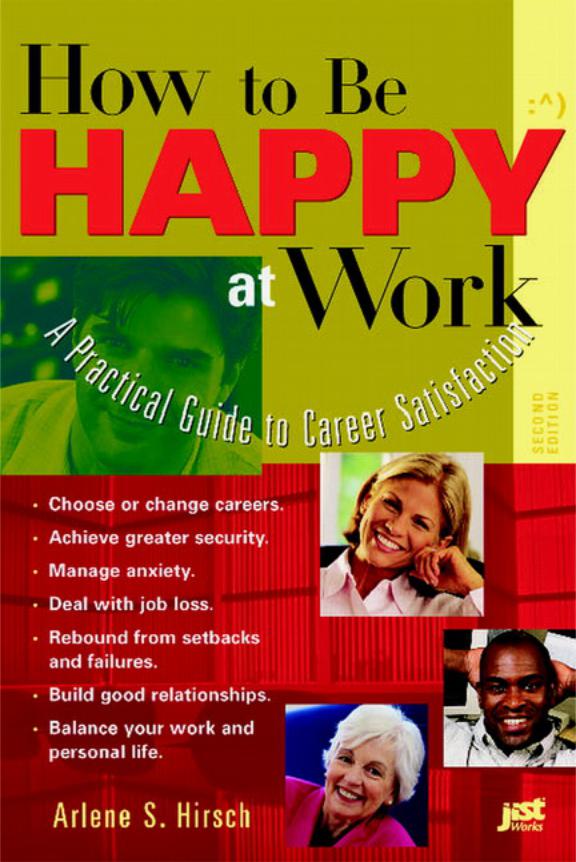
- •About This Book
- •CONTENTS
- •Looking Forward to Career Growth
- •Take a Personal Career Interest Survey
- •Rule 1: Motivation Is the Key to Success
- •Rule 2: Success Takes Hard Work
- •Rule 3: Follow Your Dream
- •Rule 4: Honor Your Talents
- •Rule 5: Manage Yourself
- •Rule 6: Take Calculated Risks
- •The Thrill of Defeat?
- •Common Causes of Career Failure
- •Turning Failures Around
- •Are You Just Waiting for a Pension?
- •A New Phase of Life
- •Managing Late Career Change
- •Limitless Potential
- •Do Good Work
- •Develop Marketable Skills
- •Be Willing to Pitch In
- •Expect the Unexpected
- •Develop an Innovative Spirit
- •Learn to Manage Risk
- •Know How to Job Hunt
- •Feed Your Rolodex
- •Strategy 1: Stop Watching the Clock
- •Strategy 2: Learn to Take a Compliment
- •Strategy 4: Take Criticism for What It’s Worth
- •Strategy 5: View Politics as a Challenge
- •Strategy 6: Build Positive Relationships
- •Strategy 7: Stay Positive
- •Strategy 8: Take Responsibility for Your Own Happiness
- •Strategy 9: Don’t Confuse Your Job with Your Life
- •Strategy 10: Have a Plan to Get Out
- •Anxiety Rules
- •Get in Touch with Your Emotions
- •Devise New Solutions
- •Make a Commitment to Be Part of the Solution
- •Attitude Is a Key Variable
- •View This as a Learning Opportunity
- •Be Prepared to Walk Away
- •The Lies We Tell Ourselves
- •Timing Your Departure
- •An Emotional Journey
- •Saying Farewell
- •An FBI Agent Stands Up for Her Principles
- •A Lack of Ethics
- •The Argument for Business Ethics
- •Fight Subtle Pressures
- •Find a Role Model
- •Defend Your Rights
- •Reshape the World
- •Trust Your Inner Strength
- •Take a Break
- •Thinking of a Permanent Vacation?
- •Starting a Whole New Life
- •Less Is More?
- •Alternative Work Arrangements
- •Pay Attention to Yourself
- •Start on the Right Foot
- •Laughter Really Is the Best Medicine
- •Laugh in the Face of Fear
- •Finding Everyday Fun
- •From Play to Success
- •What Delights You?
- •Take on a New Adventure
- •Improve Your Social Life
- •Managing Your Boss
- •Finding a Mentor
- •Starting Your Own Business
- •INDEX


How to Be :^)
HAPPY
A P r a ctical
G
u
i
at
d |
|
e |
t |
|
Workn |
|||||||||||
|
|
|
|
|
|
|
|
|
|
o |
|
|
|
|
|
|
|
|
|
|
i |
|
|
|
|
|
|
|
|
|
|
|
t |
|
|
|
|
|
|
|
|
|
|
c |
|
|
|
|
|
|
|
|
|
|
a |
|
|
||
|
|
|
|
|
|
f |
|
|
|
||
|
|
|
|
|
s |
|
|
|
|
||
|
|
|
|
i |
|
|
|
|
D |
||
|
|
|
|
t |
|
|
|
|
|
||
|
|
|
|
|
|
|
|
|
|
||
|
|
|
a |
|
|
|
|
|
|
N |
|
|
|
r |
S |
|
|
|
|
|
|
|
|
|
|
|
|
|
|
|
|
|
|
||
o Car |
e |
|
|
|
|
|
|
|
|
OCES |
|
e |
|
|
|
|
|
|
|
|
|
|
|
E D I T I O N
Arlene S . Hirsch
America’s Career Publisher

How to Be Happy at Work, Second Edition
© 2004 by Arlene S. Hirsch
Published by JIST Works, an imprint of JIST Publishing, Inc. 8902 Otis Avenue
Indianapolis, IN 46216-1033
Phone: 1-800-648-JIST |
Fax: 1-800-JIST-FAX |
E-mail: info@jist.com |
Visit our Web site at www.jist.com for information on JIST, free job search tips, book chapters, and ordering instructions for our many products!
Quantity discounts are available for JIST books. Please call our Sales Department at 1-800-648-5478 for a free catalog and more information.
Acquisitions and Development Editor: Lori Cates Hand
Interior Designers: designLab, Seattle; Trudy Coler
Page Layout: Trudy Coler
Cover Designer: Nick Anderson
Proofreader: Deb Kincaid
Printed in Canada
07 06 05 04 03 9 8 7 6 5 4 3 2 1
Library of Congress Cataloging-in-Publication Data
Hirsch, Arlene S., 1951-
How to be happy at work : a practical guide to career satisfaction / Arlene S. Hirsch.-- 2nd ed.
p. cm.
Rev. ed. of: Love your work and success will follow. c1996.
Includes index.
ISBN 1-56370-980-5
1. Vocational guidance. 2. Success in business. 3. Job satisfaction. I. Hirsch, Arlene S., 1951Love your work and success will follow. II. Title.
HF5381.H516 2004
650.1--dc22 |
2003017302 |
All rights reserved. No part of this book may be reproduced in any form or by any means, or stored in a database or retrieval system, without prior written permission of the publisher except in the case of brief quotations embodied in articles or reviews. Making copies of any part of this book for any purpose other than your own personal use is a violation of United States copyright laws.
We have been careful to provide accurate information in this book, but it is possible that errors and omissions have been introduced. Please consider this in making any career plans or other important decisions. Trust your own judgment above all else and in all things.
Trademarks: All brand names and product names used in this book are trade names, service marks, trademarks, or registered trademarks of their respective owners.

About This Book
It’s not easy to tell others how to be happy at work, especially people who feel as if they’re living in a career combat zone. I know the battleground well. For the past 20 years, I’ve been a career counselor, psychotherapist, and corporate outplacement consultant. In that time, I’ve seen more casualties of the career wars than most people experience in a lifetime. I know what it takes to be happy with your work. But I also know there’s no simple formula to achieve career success and satisfaction.
The workplace is chaotic. If you’re like most people, you probably feel that you’re living a career nightmare: working harder to make a living with fewer available resources, more demands on your time, and lots of disincentives to achievement. Perhaps you fantasize about chucking the whole scene. Right about now, life on the golf course, ski slopes, or a sandy beach can look mighty appealing.
Maybe you just need a good, long vacation. You don’t want to drop out of the workforce altogether, but you’re hungering for a new adventure. You want more control over your time and your destiny. Your rallying cry is More Freedom, Less Office Politics!
This book is for anyone who needs a change in his or her work life. It can be a change in the kind of work you do, or in how, when, or where you do it. I’m prepared to show you how to make your career more deeply fulfilling. To use my advice, however, you’ll need to set aside your normal modus operandi. I want you to open your mind to new possibilities.
Some of my ideas might seem strange initially. Please mull them over carefully before you discard them. Although my tone is, sometimes, idealistic, I’d categorize myself as a realistic optimist. You can’t achieve your deepest desires without hope. And I have never met a really happy cynic.
In what many people call “the real world,” it’s assumed that financial success is the key ingredient to satisfaction. I question
iii

this assumption. Although economic security settles the mind and can even quiet the soul, money alone can’t create deep career fulfillment. To be deeply fulfilled through work, you must integrate your financial needs and goals with your spiritual desires. I use the word “spiritual” cautiously, knowing that it’s often equated with religion. What I have in mind is a more secular spirituality that doesn’t call forth visions of God in the workplace. Derived from the Latin word spiritus, which means “breath,” spirituality, in this sense, refers to those animating life principles that enable you to feel most completely alive.
When you bring energy, enthusiasm, and passion to your work, you infuse your livelihood with a vitality that drives away boredom. Add creativity, growth, meaning, and service, and you’ll find that alienation will disappear, too. By adding depth to your work, you can soar to greater heights. I often see people who are successful in conventional terms but otherwise are deeply dissatisfied with their careers. If that’s your situation, you might not get much sympathy from the people around you. Nevertheless, when work is not a true reflection of your interests, talents, and values, it can make you very unhappy.
In this way, I am fortunate. My counseling and writing enable me to express myself in ways that are compatible with the person I understand myself to be. They challenge me to develop my talents rather than suppress them. Although I never confuse my job title with my identity, I do believe there’s a connection between your occupation and your career fulfillment. To the extent that your work enables you to develop your talents, express your beliefs, and engage your interests, it will be satisfying. Conversely, work that doesn’t fit your skills and personality won’t be rewarding. Therefore, if you seek career fulfillment, you must always ask yourself first and foremost: Does my work suit my needs and ambitions? If the answer is no, you must take steps to remedy that problem.
When I set out to write this book, it wasn’t my intention to write a treatise on personal responsibility. But, as the project unfolded,
iv

it became abundantly clear that too much passivity is a major obstacle to career satisfaction. Far too many people live their lives according to societal, parental, or even employer agendas, instead of thinking through and acting on their own singular strengths and visions.
To see your way to a more uniquely individual life experience (and greater vocational satisfaction), you must deprogram yourself from what others want you to do and expect you to be. In writing this book, my goal is to start the ball rolling in that direction.
In part 1, I introduce a number of psychological challenges that are important to address and resolve on the road to career satisfaction, including the all-important need to create a personal life agenda and timetable.
In part 2, I address some of the tough organizational realities that have evolved over the last decade. At a time when job security has vanished and organizational restructuring is on nearly every corporate menu, it’s crucial to take more aggressive responsibility for your short-and long-term career goals. Although it’s difficult to control your career destiny in today’s environment, which is more like emotional quicksand than solid ground, it’s still possible to influence your surroundings and development in healthy ways. Amid the change and chaos, there are genuine opportunities for growth and happiness. But the spoils don’t go to the timid or the passive. You have to assert yourself in the right way to the right people.
Finally, part 3 continues to pursue the theme of personal responsibility. The chapters in this part explore alternative work styles and schedules that you can adopt to increase autonomy and enhance the quality of your life; and build on the twin themes of interconnection and collaboration.
At the end of each chapter, I’ve included a “Thought-Starter Worksheet” to set you on the road to healthy introspection. Please don’t complete these exercises on the Stairmaster. Find
v

yourself a quiet place to reflect on your thoughts, experiences, and desires, and write your answers in the spaces provided.
We’re an action-oriented society: a nation of doers. But when it comes to career fulfillment, the path to happiness begins inwardly, with introspection and self-knowledge. Professionally speaking, I was raised in the world of psychoanalysis, where there’s a strongly held conviction that all healthy, self-directed action rests firmly on the foundation of self-knowledge. Knowing that, you won’t be surprised to discover that my first goal in this book is to increase your capacity for introspection and deepen your self-knowledge. That process requires your active participation.
To be truly happy with your work, you must forge a path that fits your needs and life goals. No one is going to hand you the perfect career on the proverbial “silver platter.” The issue, as psychiatrist Thomas Szasz tells us, is not whether or not you’ve found yourself; it’s whether or not you’ve taken the time to create yourself.
Freud once identified “work” and “love” as the two greatest sources of human happiness. For me, this book has been a true labor of love. If it helps you make fulfilling life and work changes, it will have done its job and I, too, will be well satisfied.
—Arlene S. Hirsch
Dedication
To Nancy Hirsch
vi
